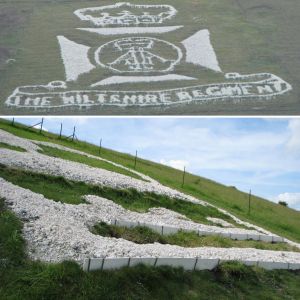Swish Building Products Aids Unique Restoration
October 23, 2014 at 6:53 AM

Swish Building Products has supplied over 200 metres of white PVC-U flat board for a unique restoration project on behalf of the Fovant Badges Society. The boards have been installed as part of an experimental maintenance programme to restore and protect three of the regimental badges carved into the Fovant Down in Wiltshire.
Their location, carved into the side of a 30 degree slope is a constant issue for the conservation team, coupled with a combination of loose chalk, gravity and an invasion of grazing cattle! "Gravity continues to be our biggest challenge when it comes to maintaining the definition of the badges," comments Don McLaren of the Fovant Badges Socity, "...and it's not helped by the horrendous rainfall we keep having. We wanted a solution which would help keep the chalk in position without distracting from the Badges.
"We chose the PVC-U flat boards from Swish simply because they're unobtrusive, durable and will withstand the ravages of the weather. The boards have been positioned along the downward facing areas of the Badges with the hope that they will keep the chalk up the hill."
During the trial period the Badges will be assessed to see whether the chalk continues to migrate down the hillside; if the boards stand out as an artificial aid particularly once the chalk begins to weather and discolour, and also whether the fixing methods are adequate.
Scheduled by English Heritage as Ancient Monuments the restoration and up-keep of the Fovant Badges is of national and historical importance. The chalk emblems commemorate those lost during The Great War, carved into the hillside by their comrades British and Australian soldiers billeted at the military camp in the village of Fovant.
By the end of the First World War there were 20 discernible badges. During the Second World War these were left to become overgrown and indistinguishable to prevent enemy aircraft using them as reference points. Between 1948 and 1951 two more badges were cut in remembrance of two Wiltshire regiments, and another on behalf of the Royal Signals was added in 1970.
With the trial period soon to enter its most testing season, the conservation team are keen to see how the boards perform, "So far, so good," concludes Don, "...at this stage we feel the boards are a success and we've received some favourable comments." The Society aims to complete the restoration of all the badges by 2016 ahead of their centenary celebrations, marking 100 years since the carving of the first regimental badge.